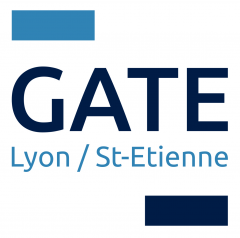Scientific strategy
GATE Lyon Saint-Étienne contributes to the science of individual and collective decisions with a particular focus on strategic, behavioral, institutional and spatial dimensions. A key dimension of its identity is its disciplinary openness, notably to psychology, neuroscience, biology, mathematics, political science and political philosophy. GATE Lyon Saint-Étienne now enjoys national and international recognition through the creation of areas of excellence.
The research conducted at GATE Lyon-St Etienne is structured around four research areas:
Game theory, social choice and markets: This topic uses the tools of theoretical and empirical microeconomics and has three main scientific objectives: (1) Studying solutions for collective decision-making problems in very general environments. (2) Applying these solutions to specific environments, such as healthcare or innovation. (3) Studying the intellectual foundations for principles of fairness or social justice.
Behavioral economics: The research conducted within this research area uses the tools of experimental economics to study decision-making and social interactions. It scientific interests are three-fold: (1) The role of institutions in forming moral and social preferences. (2) The role of cognition (mental processes, emotions and beliefs) in human behavior. (3) The structure of organizations and incentives, including new contexts of human-robot interaction. This research is supported by LabEx CORTEX.
Development, institutions, cities and regions: This research area develops theoretical and empirical tools of applied microeconomics to study: (1) The design and evaluation of public policies in the areas of employment, taxation, innovation, housing, environment and health. (2) The determinants and consequences of urbanization and the spatial organization of activities. (3) The origins and consequences of violence and democratic balance. Part of this research is supported by LabEx IMU.
Macroeconomics, finance and history: This research area focuses on three key themes related to monetary economics: (1) The study of business cycles in open and financialized economies and the role of economic policies. (2) The integration of behavioral dimensions in macroeconomic and financial analysis. (3) The study of the history of macroeconomics with a focus on the foundations of monetary policy and the history of banking practices.
Experimental platform
GATE Lyon Saint-Étienne is equipped with a world-leading experimental platform called GATE-LAB, which enables researchers in behavioral and experimental economics to conduct studies on human decision-making behavior using a wide range of experimental protocols.
It includes an experimental laboratory with 32 computers, an electrophysiological measurement room with 12 stations (Skin Conductance Responses, BIOPAC), an eye-tracking room and a mobile laboratory capable of carrying out a range of experiments in a controlled environment and on-site (especially in companies).
National and international collaborations
GATE Lyon Saint-Étienne is developing international research collaborations with more than 60 foreign universities, including: Duke University, Osaka University, Berlin Institute of Technology, Johns Hopkins University, University of Bologna, Chapman University, University of Naples Federico II, University of Alicante, University of Seville, University of Southampton, Catholic University of Leuven, University of California at Santa Barbara, Appalachian State University, George Mason University, University of Sydney, Monash University, New York University Abu Dhabi, University of Amsterdam, Université Laval, Beijing Normal University, Aarhus School of Business, University of São Paolo, etc.
GATE Lyon Saint-Étienne is a scientific partner of Journées de l'Économie and an institutional member of the AFSE (French Economic Association), the ASFEE (French Association of Experimental Economics) and it is home to the ADRES (Association for the Development of Research in Economics and Statistics). It is associated with the CORTEX (Construction, Cognitive Function, Rehabilitation and Repair of the Cortex) and IMU (Intelligence of Urban Worlds) Units of Excellence as part of the Initiative of Excellence program. The unit has obtained IDEXLYON actions.
Our scientific expertise in various fields and particularly in experimentation has enabled us to work with socioeconomic partners. We have worked on a number of contracts, notably on the topic of crime in transport, with KEOLIS and KISIO and on stress with the support of CORTEX valorization and SATT Pulsalys in cooperation with the Positive Leadership Institute and corporate partners (Sanofi, Engie, etc.). We also actively participated in the Smart Electric Lyon project in collaboration with EDF on electricity pricing methods.
We also work in partnership with SATT Pulsalys Lyon Saint-Étienne (https://www.pulsalys.fr/en) on software-related invention projects. A game can simulate the main functions of a middle/back office in a corporate and investment bank.
Publications
The unit’s researchers publish in the best scientific journals in the field of Economics, including: American Economic Review, Econometrica, Economic Journal, Economic Theory, Experimental Economics, Games and Economic Behavior, Health Economics, International Journal of Game Theory, International Economic Review, Journal of the European Economic Association, Journal of Economic Behavior and Organization, Journal of Economic Geography, Journal of Health Economics, Journal of Labor Economics, Journal of Mathematical Economics, Journal of Public Economics, Journal of Urban Economics, Public Choice, Social Choice and Welfare, etc.
GATE Lyon Saint-Étienne publishes a series of working papers, coordinates several seminars and organizes national and international events (Economic Science Association Conference, Association for Public Economic Theory Conference, AFSE Conference, ADRES Doctoral Conference, etc.).
